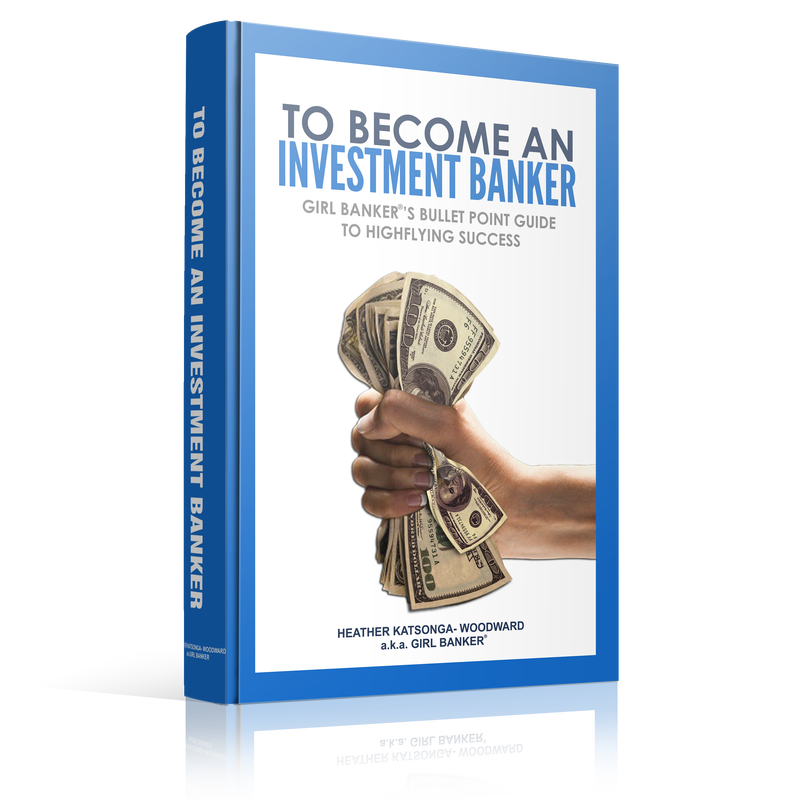
by Girl Banker®
Listen to the iTunes podcast instead. Good question. There are lots of investment banks out there. Some that you have heard of and some that you haven't. In To Become an Investment Banker, I take you through some criteria that you should look at in deciding where to apply:
Getting paid Working in an investment bank is hard work. If you manage to get into one of the top banks you will be working with some of the brightest people in the world. You need to justify your existence. The profitability of the transactions that you work on will form the basis of how much you get paid. The more deal flow your firm gets, the more likely you are to land on a good transaction. Building a fantastic résumé / CV The market value of an investment banker is based on the transactions they have worked on. The deals you work on determine a) your value inside your bank and b) your reputation and value outside the bank. The more deals you get to experience, the more valuable you become. Meeting people The more people you work with, the more you open yourself up to opportunities. Many deals involve several banks working together alongside lawyers and possibly accountants. All the people that you get exposed to help to build up your brand. The higher your firm's deal flow, the more opportunities you will have for 'branding' yourself.
Okay, so where is all the deal flow? In To Become an Investment Banker you will find a league table for the top 50 banks in All Corporate Bonds Issues in 2011. I chose this over the equity table (also in the book) because it included a much larger volume of deals.
You can find the same information below. For ease of navigation, I divided the list into 'Top 20' and 'Next 30' then ordered each list alphabetically. This list will be refreshed annually. You will find links that take you directly to the careers section of every investment bank here. Please subscribe to receive info that will help you get into investment banking directly to your inbox AND you will get Chapter 1 of To Become an Investment Banker for FREE!
2 Comments

by Girl Banker®
You’re probably thinking, "Well, if I have loads of internships at different banks on different desks that increases my chances, right?" Not necessarily.
Imagine a banker that’s been given 50 résumés/CVs and has been told to select 5 good candidates. Who do you think he’ll find more interesting: the girl or guy with 3 bank internships, or the one that built houses in Africa one summer, climbed Everest the next and has one quality bank internship?
If you sound boring and unidimensional, very few people will want to hire you because they have to work with you for many hours on a daily basis; they want to be able to chat to you about more than just what the latest Bloomberg headline is. So if you're feeling intimidated by friends that have a gazillion investment banking internships whilst you chose to do lots of other things with your holidays, trust me, there is nothing to worry about, you will stand out because of your diverse experiences. Just make sure you do an internship the summer before you want the full-time job and use To Become an Investment Banker, to maximize your chances.
by Girl Banker®
Rating: 5/5 This is probably the best business book that I am going to read all year, seriously. It’s way better thanThe Lean Startup, a book I reviewed two weeks ago. 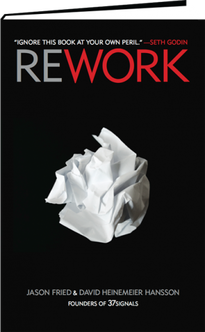
Rework is crisp and to the point. It’s written by the founders of 37signals.com, a very successful tech company that’s produced productivity tools for small businesses such as Basecamp, Highrise, Backpack and Campfire.
Over and above what they say in the book there was one overriding message that I sensed: they always go with their base instincts and adapt to changing circumstances as they arise. On business plans, they say they are a waste of time and lead to inflexibility and inaction. I agree. They do not disagree with having a rough plan but they think you shouldn’t get bogged down in it. Every number is a guess that won’t materialize anyway. On failure, they say people who fail are just as likely to fail again as people who haven’t embarked on anything before. It’s success, not failure, that leads to success. On being a workaholic, they say go home and get some sleep! You’ll be more creative and work more productively after. Consistently working late is not a badge of honor, it’s a mark of inefficiency. I agree but in the wonderful world of investment banking face time matters. You can change things on your team when you're an MD but if you want to make it to MD, you're going to put in as much face time as the biggest face timer on your team! On starting a business, they say scratch your own itch, create a product that you yourself need, you will be better able to market it. I so agree on this point. I have a friend who’s built a website on healthy eating and weight loss but he has never had a weight issue himself nor is he interested in the subject in itself. On seed money, they say using other people’s money is plan z. Don’t resort to it until you really have to. Once you have external investors they start to control you. Are you going into business to be your own woman (or man) or to be a slave to someone else’s short term profit goals? 
On constraints or limited resources, they say these are good things. Having limitations force you to think outside the box. Startups with endless cash end up spending money poorly because it is oh-so-easy to spend someone else’s dough.
On an exit strategy, they say do you go into a marriage with divorce in mind? What’s the point of going into a business if you are already thinking about how you are going to get out? I so agree. On quitting, sometimes it’s a good thing. Don’t flog a dead horse. On large tasks, break them into small bite-size pieces. I have been living by this principle myself since high school. On one-upping the competition: a waste of time. Dare to be different. On the competition: don’t obsess over what they may or may not be doing. On drug dealers, imitate them. They know their wares are sooo good that they’re willing to give some away for free. LOL! On marketing, ignore New York Times, Wall Street Journal and all the other Big Girls, they have no time for you! Target niche bloggers and publications. The big players usually go surfing for new stories in these niche places. They also talk about the benefits of saying NO; the efficiency of creating long uninterrupted periods for work; building an audience; teaching your fans things rather than just selling to them; doing everything yourself first before you delegate so that you know how hard it is; apologizing sincerely; looking beyond potential employees’ formal education and valuing their other experiences; test driving employees first and giving cover letters more weight than résumés and CVs. I say: buy buy buy!
by Girl Banker®
Listen to the iTunes podcast instead. This is a 5* book. It’s very difficult to write a non-fiction, financial saga and actually make it interesting and readable but Michael Lewis has managed to do just that in The Big Short. The book tries to grapple with why the financial crisis of 2007-2009 happened, who saw the crisis coming and what might happen now. 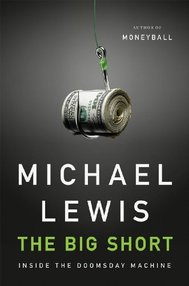
THE CAUSE OF THE FINANCIAL CRISIS
Michael Lewis goes through how the creation of financial instruments composed of money lent to people who could never afford to pay the credit back eventually led to the crisis: subprime mortgage bonds and collateralized mortgage obligations, CMOs. Mortgages were made irresistible with low ‘teaser’ rates, no need for a down-payment and, as though that wasn’t enough, no requirement for proof of income. Credit rating agencies on their behalf overrated the securities. They didn’t have access to the underlying mortgage data and were ‘too scared’ that ‘excessive’ demands for more information would lead banks to go to another rating agency taking away their fees. The rating agency models, too, were riddled with nonsensical assumptions. 
THE CLEVER GUYS THAT SAW THE CRISIS COMING
Dr Michael Burry Michael Burry, founder of Scion Capital was the first person with a strong enough opinion of how crap subprime mortgage bonds were to buy insurance against them in the form of CDS (credit default swaps). I have written a separate blog about Michael Burry. Greg Lippmann at Deutsche Bank and his quant Eugene Xu Greg Lippmann ‘bought’ Mike Burry’s view and Michael Lewis likens him to patient zero in an epidemic. He’s the guy responsible for spreading the news that subprime mortgages were going to ‘blow-up’. Their ratings and their pricing didn’t make any sense. They were illogical, based on the wrong assumptions. Greg Lippmann reinforced the view with numbers run by his quant, Eugene Xu, described in the book as the second smartest guy in China. I loved Lippmann’s line: “I don’t have any particular allegiance to Deutsche Bank, I just work there.” Classic. Most investors who heard Lippmann’s spiel weren’t comfortable enough with the idea to short (gamble against) subprime. Lippmann, Xu and a few others have since started their own hedge fund, Libremax Capital, LLC. 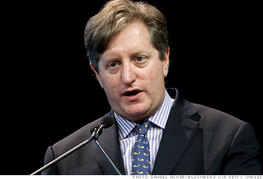 Steve Eisman Steve Eisman
Frontpoint Capital: Steve Eisman, Vincent (Vinny) Daniel and Danny Moses
In many ways these were my favorite characters in the book. They, after much persuading and analysis agreed with Lippmann’s view that subprime asset backed securities were overrated and overpriced so they put their money where their mouths were and bet on their demise. I found Eisman especially amusing because he said the most random things. In addition, whenever he encountered anyone who he thought was stupid he shorted whatever they were invested in. He shorted Wing Chau (who is now suing Michael Lewis for character defamation) and a host of top Wall Street entities: Moody’s, B of A, Citi and Merrills to name a few. His reason for shorting Merrills was that whenever something goes bad Merrill is always there. Cornwall Capital: Jamie Mai and Charlie Ledley These guys started a hedge fund, Cornwall Capital, with only USD110,000. They came to the realization of subprime products quite late. However, they did something different: whilst the first movers bet on the very worst BBB subprime mortgages, they were the first to bet on the better-rated AA layer because by that point it was clear that even that layer would fail. The bet paid off by tens of millions. 
WHO WERE THE BIG SUCKERS THAT WERE BLIND TO THE FOLLY OF SUBPRIME?
Notable characters identified by Michael Lewis as failing to see the extent of the pending crisis in addition to rating agencies are Howard Hubler who lost Morgan Stanley a shed load of money and the CEO of AIG, Joe Cassano who ruled the company like a dictator. Overall I had two main disagreements with this book: Lewis tarnished every banker with the same brush. It’s true that desks dealing in subprime took massive risks but they account only for a very small number of people that work in investment banks. You can’t blame every single banker for subprime because bankers that didn’t deal in subprime probably knew as little as a layman about the asset subclass. You can blame the CEOs of these banks because they are meant to maintain oversight. You can also blame the individual traders that made these investment decisions. I also disagreed with Lewis’s conclusion that allowing investment banks to list publicly led to excessive risk taking and hence their downfall. Personally, I think current incentive structures are the ultimate issue. Short-term profits are desired and pursued over long-term gains. Once people are incentivized to account for the long-haul performance of the financial industry should improve. My recommendation? If you want to understand the 2007-2009 financial crisis: buy, buy, buy!
by Girl Banker®
Mother Teresa, CEO: Unexpected Principles for Practical Leadership Rating: 4.5* out of 5 One of the things I love about investment banking is that you very quickly become self-employed. In the capital markets, once your manager gives you a budget to reach it's pretty much up to you how you get to the target revenue. In IBD, once you get to senior associate or junior VP you need to start showing your business acumen. I like to read business books because although there is a lot of overlap between books, I find that occasionally I discover something completely new and many times I am forced to ponder something more deeply or to experience someone else’s take on a common business principle. In Mother Teresa, CEO, the authors explain the principles Mother Teresa lived by and how these can be translated into business life. 
When I think of Mother Teresa I think of a little, old lady going around Calcutta feeding and loving the dispossessed. I do not think of a high-powered business woman. The concept of Mother Teresa as a business woman is almost alien to me, yet, she did start the organization, Missionaries of Charity, which at the time of her death had 594 missions in over 100 countries.
Mother Teresa was a doer. She had a vision and she followed it through. She was authentic and she lived the values that she preached. The eight principles that the book elaborates are:

There were two principles that I particularly liked: 4 & 8.
You would never believe it was true but even Mother Teresa had doubts. She never doubted her vision of helping the poorest of the poor but apparently her personal diaries talk about the moments of doubt that she had in God; as well as the loneliness that she faced as a result of dedicating her whole self to the mission. The book talks about using doubt to question yourself and to avoid paralyzing fear. I feel encouraged by Mother Teresa’s belief that we may feel that what we are doing is just a drop in the ocean but that the ocean would be less without that drop. The second important thing I discovered was using the power of silence. This is something I hardly do or don’t do enough. I do, however, agree that stepping away from the hustle and bustle of daily life, meditating and just being you have to be good for you. Overall, I would recommend this book. I used the audio version from Audible which is a mere 2 hours and 7 minutes long. It’s a very short book, only 144 pages, so you should be able to get through it in no time at all.
by Girl Banker®
Listen to the iTunes podcast instead. If you want to maximize your chances of getting into investment banking the best time to apply is roughly eighteen months before you need the full-time job! Let me explain... You must do an investment banking internship the year before you graduate. In To Become an Investment Banker, I talk extensively about how you can go about finding yourself the perfect internship. The top investment banks have 8 to 12 week internship programs every summer. This internship is essentially, a long interview. At the end of that period they decide who in that pool of interns has what it takes to hack the world of investment banking. It makes sense because a much more informed decision can be made after observing someone for a few weeks than through a series of short interviews.  Source: thejfblogit.co.uk Source: thejfblogit.co.uk
Those people that are chosen are offered a job to start the following year, when they actually graduate.
So, if you’re reading this already in your final year and thinking of getting into investment banking when you graduate in the summer, sorry, but most of those jobs are G.O.N.E. You might still get a job but you’re shooting for a smaller pool of spaces. The key here is to intern the year before you graduate; not two years before, not three years before - just the year before. To give you a real timeline:
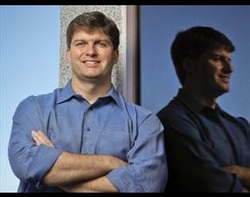
by Girl Banker®
Listen to the iTunes podcast instead. I hadn't heard of Michael Burry until very recently but I am already in awe of him, not least because he is only 12 years older than I am. Michael Burry is profiled in The Big Short by Michael Lewis. Lewis’s description of Michael Burry’s character clearly alluded to some form of autism and I just found out that he has Asperger’s syndrome. So what is so special about this Michael Burry guy? Basically, he’s a star stock picker. He trained as a neurologist but had always had an innate interest in value investing (stock picking). In 1996, he started a blog describing the stocks he was investing in and why (all done after gruelling shifts at the hospital). In no time at all he had a dedicated following that included amateurs and professional investors alike. In late 2000, he quit medicine to start his own fund, Scion Capital. My only wish is that he had left his blog up for posterity even if he was no longer able to update it. He had very little money to start with but, "in his first full year, 2001, the S&P 500 fell 11.88 percent. Scion was up 55 percent. The next year, the S&P 500 fell again, by 22.1 percent, and yet Scion was up again: 16 percent. The next year, 2003, the stock market finally turned around and rose 28.69 percent, but Mike Burry beat it again—his investments rose by 50 percent. By the end of 2004, Mike Burry was managing $600 million and turning money away." (Michael Lewis) Double wow!
Many of his first investors were people that had fallen in love with Burry’s investing style via his blog. Apparently, they wouldn’t have fallen in love with him if he’d set up investor meetings as the first form of contact because he’s socially awkward, a natural result of Asperger’s.
Burry was one of the more astute investors that bet against subprime mortgages making himself and his investors millions in the process. I am personally anti speculation for the sake of just gambling, however, if you have a strong view, have done rigorous analysis and no one else agrees with you, the only way to show them how much smarter than them you are is to do the opposite of what they’re doing. In Burry’s case, that was shorting (betting against) subprime mortgage products using CDS (credit default swaps). In fact, when he started buying credit default swaps (CDS) against subprime, no one else was doing it, he had a first-mover advantage and collated a cool yard (that's a billion) in notional for a song. When he told them of the ‘pending’ crisis, nobody wanted to believe Burry not even some of his own investors. Some probably laughed at his ‘crazy’ ideas behind his back. But from Nov-2000 to Jun-2008 Scion made a return of 489% after fees and expenses. And indeed he who laughs last laughs loudest and Burry is laughing all the way to the bank. For personal reasons, Burry decided to wind up his fund in early 2008 (before Lehman’s crash in September 2008). You’re probably thinking, "some guys have all the luck," right? Well trust me, you probably wouldn’t swap your life for Burry’s: he was struck with cancer at a very young age and as though that wasn’t enough he lost the vision in one eye completely during a surgical procedure.
Why did Burry wind up Scion?
At first, I thought it was because he'd amassed enough personal wealth to invest without the hassle of outside investors, however, by the time I finished reading the book it became clear that he started losing interest in finance, it was no longer worth the stress and he felt his health and well-being were at risk. Although his old blogs are no longer available. You can get some insight via scioncapital.com and I also found this random blog ran by a fan. If you want to learn more about how CDS works, there is a great explanation in To Become an Investment Banker.
by Girl Banker®
Investment bankers don’t invest although the name may suggest it. If your day job involves advising people what to invest their funds in: equities versus debt versus real estate and so on, you are an “asset manager”. Asset management is not investment banking.
Investment bankers also don’t give out loans or handle money of any form. Whilst investment bankers might structure loans, they don’t give them out themselves. Handing out loans is the function of a commercial or retail banker. Some investment banks have their own commercial banking units, others do not. Investment bankers fall into two categories: corporate finance bankers (also referred to as classic investment banking) and capital markets bankers (product salespeople and traders). I will describe each category in turn. 
CORPORATE FINANCE
Corporate finance is concerned with giving advice on strategy, valuation and financing. I myself spent two years in Corporate Finance at Goldman Sachs in London. Strategy If a company wants to merge with or takeover another company, so called, Mergers and Acquisitions, or if they want to divest a division or find a seller for the entire company as a going concern they would seek the advice of an investment bank. M&A bankers have specialized knowledge of a specific sector and are in a position to relay the best way of going about any corporate strategic initiative. Valuation As part of its strategic considerations, a company will contemplate its own value, the value of a target or the market value of its competitors. Investment bankers are trained in all current, relevant valuation methodologies and would be able to provide this information. Key valuation metrics include discounted cash flow analysis which shows the value of a company on a stand-alone basis and a variety of ratios that show a company’s value in comparison to other similar companies. Relative valuation metrics look at the company’s value relative to sales, or the share price relative to earnings or the amount of debt the company has compared to its cash flow and earnings. Relative valuation tends to focus on companies that are listed or have recently been involved in an acquisition because data is more readily available. However, using less specific assumptions the same analysis can be carried out for a privately held entity. Financing Particularly in the developed world, financing is not as simple as going to a bank to get a loan. There are a plethora of instruments that can be used to fund a business. Loans themselves can be structured in a variety of different ways each of which will have different tax, legal and rating agency consequences. Rather than attempt to secure bank lending, a company can alternatively issue a bond to investors. Bond structures themselves are limited only by imagination. They are bespoke instruments that can be exactly structured to satisfy the goals of a firm, it’s expected growth profile and its expectations of future changes in market variables particularly interest rates and foreign exchange, FX. This brings us neatly to the second category of bankers. 
CAPITAL MARKETS
Compared to Classic IB, capital markets banking is relatively new. It took off in the early 80s and has grown massively particularly as internet technology and the ease of communication has improved. Capital markets bankers are financial product engineers. Product specialism is split into Equity Capital Markets, ECM, which includes cash equities and equity derivatives and Debt Capital Markets, DCM, sometimes referred to as Fixed Income, Currency and Commodities, FICC. I have spent the best part of 5 years working in debt capital markets as a derivatives structurer at HSBC. You will notice one difference between corporate finance and capital markets immediately. Whilst there may be many different sectors and country teams in corporate finance, the analytical tools they use are the same. Valuation fundamentals do not change. However, the various teams in the capital markets each deal with a different product so the tools and knowledge change completely from one team to the next. Within capital markets salespeople market and often also price/structure products whilst traders execute any sales and manage the risk/exposure thereof. Some traders trade based on perceived market opportunities rather than off of the back of client orders. These are proprietary traders. Their aim is to generate a return for their bank based on market expectations (speculation) or perceived mispricing (arbitrage). I will very briefly describe a few teams. Cash equities Have a firm understanding of the equity research within a specific sector. Based on their understanding and interpretation of equity research they can give advice regarding which shares are a good buy, which are not and which ones are better than others. Equity derivatives You don’t have to buy shares to gain exposure to a company. Equity derivatives allow you to express your view of a company, good or bad, without buying them and if that view is realized you make a profit. Buying and selling equity options is cheaper than transacting in the shares themselves. Loan or bond origination and structuring Originators have a relationship with investors that are interested in buy bonds (or loans). They use their contacts and their knowledge of current bond (or loan) markets to structure a bond prospectus (a detailed term sheet) that will get a company the most traction with investors. Rates Most companies have some debt on their balance sheet. Rates specialists help companies to protect themselves against adverse movements in rates and to make optimal funding decisions based on interest rates in different countries and the expected evolution of rates over time. FX Many companies, even small ones, have multinational exposure. They might sell goods across several countries, buy supplies or even raise funds from abroad. FX specialists help companies to protect themselves against adverse movements in FX and to manage funds across borders. This can be a very important requirement for a company especially if they have exposure to a country with many rules and exchange controls. China is one such country, in the last few years as they have been loosening their currency controls regulation has been changing rapidly. Commodities Commodity specialists help companies to protect themselves against adverse movements in a given commodity. They also facilitate investors’ desire to speculate on commodity prices. Commonly traded commodities include oil, precious metals and agricultural produce such as wheat. Credit Credit specialists allow investors to buy ‘insurance’ against a company’s failure using ‘credit default swaps’. A huge amount can be written about each function within an investment bank and I provide a more in-depth overview in To Become an Investment Banker. Nonetheless, the brief descriptions above should give you a flavor for how front-line investment banking is structured. If you have any questions please contact me. |
Girl Banker®I created my investment banking blog in 2012 as soon as I resigned from i-banking & published my book, To Become An Investment Banker.
Initially published at girlbanker.com, all posts were later subsumed into my personal website under katsonga.com/GirlBanker. With 7 years of front office i-banking experience from Goldman Sachs and HSBC, in both classic IBD (corporate finance) and Derivatives (DCM / FICC), the aim of GirlBanker.com was to make it as straight-forward as possible to get into a top tier investment bank. I'm also a CFA survivor having passed all three levels on the first attempt within 18 months - the shortest time possible. Categories
All
Archives
August 2017
|
Heather Katsonga-Woodward, a massive personal finance fanatic.
** All views expressed are my own and not those of any employer, past or present. ** Please get professional advice before re-arranging your personal finances.








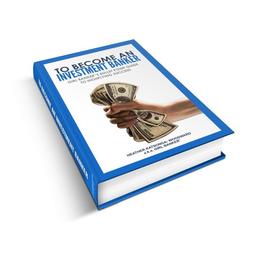

 RSS Feed
RSS Feed
